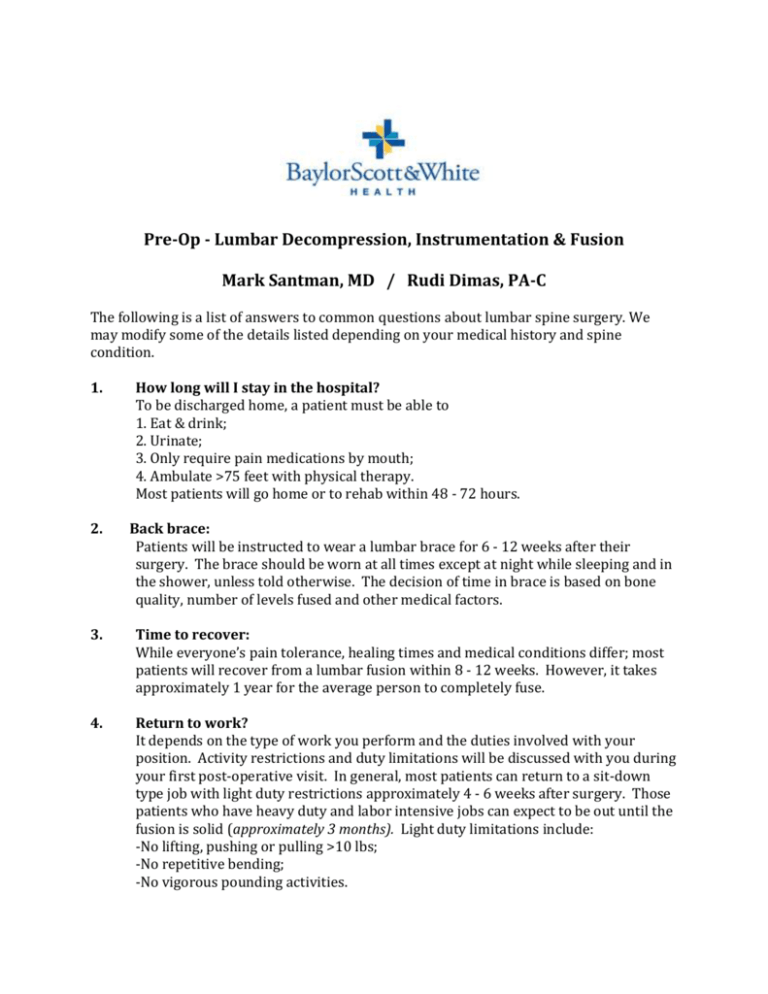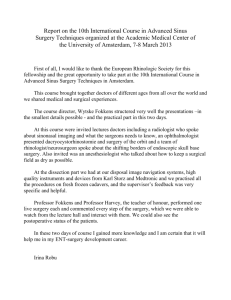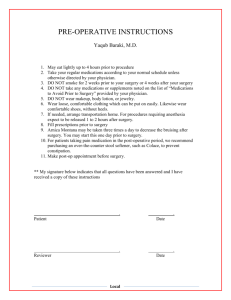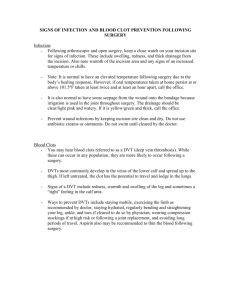Pre-Op - Lumbar Decompression, Instrumentation & Fusion
advertisement

Pre-Op - Lumbar Decompression, Instrumentation & Fusion Mark Santman, MD / Rudi Dimas, PA-C The following is a list of answers to common questions about lumbar spine surgery. We may modify some of the details listed depending on your medical history and spine condition. 1. How long will I stay in the hospital? To be discharged home, a patient must be able to 1. Eat & drink; 2. Urinate; 3. Only require pain medications by mouth; 4. Ambulate >75 feet with physical therapy. Most patients will go home or to rehab within 48 - 72 hours. 2. Back brace: Patients will be instructed to wear a lumbar brace for 6 - 12 weeks after their surgery. The brace should be worn at all times except at night while sleeping and in the shower, unless told otherwise. The decision of time in brace is based on bone quality, number of levels fused and other medical factors. 3. Time to recover: While everyone’s pain tolerance, healing times and medical conditions differ; most patients will recover from a lumbar fusion within 8 - 12 weeks. However, it takes approximately 1 year for the average person to completely fuse. 4. Return to work? It depends on the type of work you perform and the duties involved with your position. Activity restrictions and duty limitations will be discussed with you during your first post-operative visit. In general, most patients can return to a sit-down type job with light duty restrictions approximately 4 - 6 weeks after surgery. Those patients who have heavy duty and labor intensive jobs can expect to be out until the fusion is solid (approximately 3 months). Light duty limitations include: -No lifting, pushing or pulling >10 lbs; -No repetitive bending; -No vigorous pounding activities. 5. When can I drive? Most patients can drive in 6 weeks. Driving while under the influence of any narcotics or pain medications is against the law. 6. Surgical incision: Your incision will be closed with internal dissolvable sutures. The skin will be sealed with surgical superglue (Dermabond). You may get your incision wet in the shower the first day after surgery; however, do not scrub or soak the incision. Pat dry and reapply dressing daily until your first post-operative appointment. No baths or pools for 2 weeks. Please do not put tape on the surgical superglue. 7. Surgical drain: During surgery, a small drain is placed to help prevent a hematoma (collection of blood within the soft tissue) from developing under the incision. The drain is normally discontinued with 48 - 72 hours after surgery and prior to discharge home. 8. When can I take a bath? Approximately 2 weeks. No submersion or soaking incision in water such as a bath, hot tub or swimming pool until your incision has completely healed. 9. When can I take a shower? You may shower 1 - 2 days after surgery; however, do not scrub your incision and pat the area dry after you shower. 10. Walking after surgery: Patients are encouraged to walk with assistance the morning after surgery. You may stand at the bedside and/or walk the night of surgery if you request to get up. After discharge, we recommend you walk several times a day as tolerated. 11. Will I require the use of a walker or cane? Some patients will require an assistive device such as a cane or walker after surgery. This is determined on an individual basis after surgery. 12. Physical therapy: Physical therapy is consulted on every patient. Upon discharge, you will either go home or to rehab: A). If you go home, it is recommended you walk several times a day. We can arrange for a home health physical therapist to visit your home and help with the rehabilitation process. B). If you go to rehab, the rehab doctor will instruct physical therapy how to start your rehabilitation process. 13. Follow up visits after surgery: 1st appointment will be 2 weeks after surgery with the PA. 2nd appointment will be 6 weeks after surgery with Dr. Santman. You will have X-Rays performed before each visit. Please show up 30 minutes early. 14. How much weight can I lift? No more than TEN pounds. A gallon of milk is a good reference for ten pounds. 15. Sexual relations after surgery: Yes, you may resume sexual activities as soon as you feel up to it. This may vary from a few days to a few weeks after your back surgery. Remember, no lifting >10 lbs, no repetitive bending and no vigorous pounding movements. Avoid positions which will cause an increase in back discomfort. 16. Travel: Most patients are free to travel after their initial post-operative appointment (14 days after surgery). Keep in mind; you will not be able to carry any luggage greater than 10 pounds after your surgery. We recommend you get up and walk around every 30 minutes to an hour to help prevent a blood clot and low back stiffness. 17. Stool softeners: Narcotic medications can cause constipation. If you have a history of constipation, we recommend you take a stool softener with a full glass of water while taking pain medications. If you become constipated, you may try other over-the-counter medications (Colace, Milk of Magnesia, Bisacodyl, Fleets Enema and/or Magnesium Citrate); however, if you have abdominal pain, nausea or vomiting, fevers or chills, or blood in your stool: call your doctor or go to emergency room immediately. 18. Walking up/down stairs: Most patients are allowed to walk up or down stairs after surgery if they were able to walk stairs before surgery. We recommend you limit the amount of times you go up & down the stairs and use the hand rail the first few days after surgery. 19. Swimming pools: You may swim approximately 2-3 weeks after surgery if your incision is completely healed. No diving. 20. When will my pain improve? Every patient’s pain tolerance, swelling and medical conditions vary. In general, most patients experience immediate relief of nerve pain the day of surgery. It is not uncommon to have low back pain, muscle spasms & incisional tenderness for several weeks after surgery. Some patients may develop a hematoma (collection of blood within the soft tissue) under the incision after surgery. If a hematoma develops, we recommend using a heating pad for 15 - 20 minutes 3 - 4 times a day as needed (do not use heating pad to the incisional area until 1 week after surgery). A hematoma can resolve slowly over weeks to months and does not require additional surgery. 21. Why does everything hurt a few days after surgery when I felt so good immediately afterwards? There are several reasons: A) During surgery, you were given medications along with anesthesia to help relax your muscles and decrease your pain. The combination of medications may stay in your system for a couple days after surgery. B) As you start feeling better, you will become more active and this increase in physical activity can lead to an increase in swelling and muscle spasming which results in more pain. Swelling can occur up to several weeks after surgery. 22. Sore Throat: A sore throat and/or difficulty swallowing can result from general anesthesia and intubation. Endotracheal intubation involves inserting a “tube” in your airway during surgery to help you breath. This may result in swelling of your throat. Mild soreness and difficulty swallowing is normal and usually resolves within a few weeks to a few months. 23. Tobacco products: NO tobacco for 6 weeks before surgery and for a minimum of 6 months after surgery. 24. Aspirin and NSAID’s: Stop all NSAID’s (Motrin, Naproxen, Mobic, Aleve, etc.) and Aspirin 10 days before surgery. You may restart Aspirin after discharge from the hospital; however, DO NOT restart or take any NSAID’s for 3 months after a spinal fusion. 25. Blood Thinners: Stop Plavix for 2 weeks prior to surgery. Stop Coumadin 5 days prior to surgery. (Only stop blood thinners if ok with your PCP and/or Cardiologist). You may restart Plavix and/or Coumadin 1 week after surgery. 26. Pain medication: We will give you a prescription for pain medication upon discharge form the hospital; and continue to prescribe all pain medication for 3 months after surgery. If you need a medication refill after surgery, call the office at (512) 509 0235 between 8 am – 4 pm, Monday thru Thursday. It may take 24 hours before script is ready. Medication refills are not given after hours or on the weekends. Occasionally, we may have your pain management provider continue to prescribe all medications after surgery. 27. The night before surgery: Do NOT eat anything or drink fluids after midnight the night before surgery. Put all your medications in a bag and have them available the morning of surgery. Pack your overnight bag, toiletries, medications and back brace. Leave jewelry and valuables at home. Bring any Advance Directives and Medical Power of Attorney paperwork. Shower with the Chlorhexadine wash given to you at the pre-op visit. Set your alarm clock.








